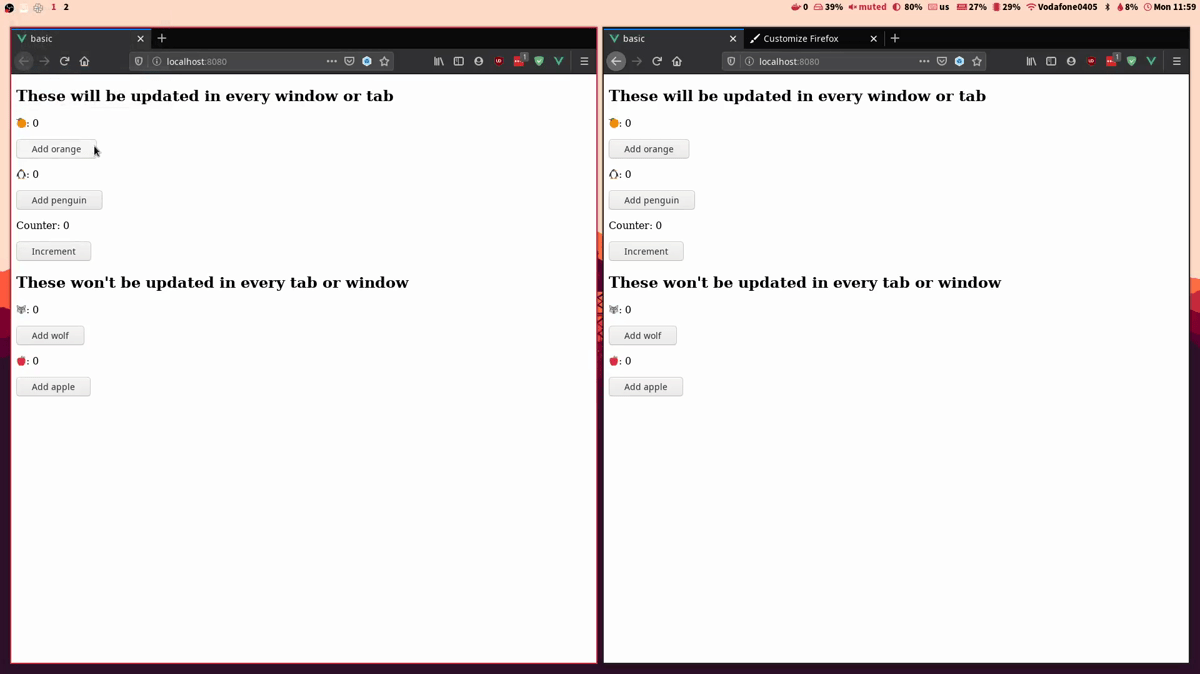vuex-multi-tab-state
This Vuex plugin allows you to sync and share the status of your Vue application across multiple tabs or windows using the local storage.
This repository has a gitter chat where you can ask questions and propose new features:
Vue 3 and Vuex 4 compatibility :warning:
The plugin has been tested with Vue 3 and Vuex 4 and no problems have been found. There is an issue where you can find how the plugin has been used using the new Vue 3 Composition API. If you encounter a problem using the plugin with Vue 3 and Vuex 4, please post it there.
Installation
vuex-multi-tab-state is available in npm and can be installed with the following command:
npm i vuex-multi-tab-stateUsage
Just import vuex-multi-tab-state and add it in the plugins list of your Vuex Store object.
import Vue from 'vue';
import Vuex from 'vuex';
import createMultiTabState from 'vuex-multi-tab-state';
Vue.use(Vuex);
export default new Vuex.Store({
state: { ... },
mutations: { ... },
actions: { ... },
getters: { ... },
plugins: [
createMultiTabState(),
],
});You can check the example provided here
NuxtJS
Integrating the plugin in NuxtJS requires a little more effort than in Vue. First
of all, we have to create a file inside the plugins directory.
// ~/plugins/multiTabState.client.js
import createMultiTabState from 'vuex-multi-tab-state';
export default ({ store }) => {
createMultiTabState()(store);
};Note that the filename must have the following format *.client.js. The next
step is to add this plugin to NuxtJS in nuxt.config.js:
// nuxt.config.js
export default {
...
plugins: [{ src: '~/plugins/multiTabState.client.js' }],
...
}If you didn't name the file according to the specified format, you can add the plugin this way:
// nuxt.config.js
export default {
...
plugins: [{ src: '~/plugins/multiTabState.client.js', mode: 'client' }],
...
}Both ways tell NuxtJS that the plugin should only be run client-side
(because the plugin uses window, not available server-side).
API
createMultiTabState({options})
Creates a new instance of the plugin with the given options. The possible options are as follows:
-
statesPaths Array<String>: contains the name of the states to be synchronized with dot notation. If the param is not provided, the whole state of your app will be sync. Defaults to[].Example: Only the oranges will be synchronized.
export default new Vuex.Store({ state: { fruits: { oranges: 0, apples: 0, }, }, plugins: [createMultiTabState({ statesPaths: ['fruits.oranges'], })], }); -
key? <String>: key of the local storage in which the state will be stored. Defaults to'vuex-multi-tab'. -
onBeforeReplace? <Function>: hook function that receives the state and allows to modify it before replacing it. The function can return either a modified state or afalsyvalue (which means that no modifications has been done inside the hook). -
onBeforeSave? <Function>: hook function that receives the state and allows to modify it before saving it in local storage. The function can return either a modified state or afalsyvalue (which means that no modifications has been done inside the hook).export default new Vuex.Store({ state: { fruits: { oranges: 0, apples: 0, }, }, plugins: [createMultiTabState({ statesPaths: ['fruits.oranges'], onBeforeSave: (state) => { // Modify state here return state; }, onBeforeReplace: (state) => { // Modify state here return state; } })], });
Test
The tests have been written with mocha and chai.
npm install
npm run testCollaborate
If you feel that something can be improved, go on, create a pull request! Please follow the programming style and document your changes correctly.
License
This project is under the MIT license. More information here.







